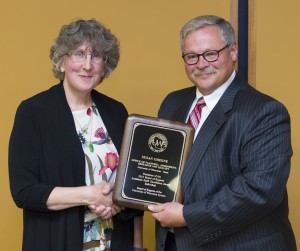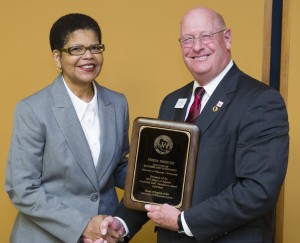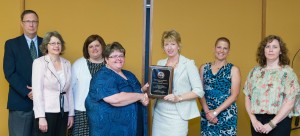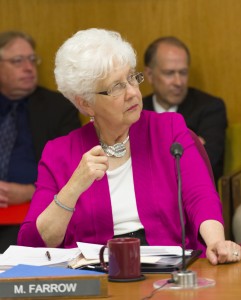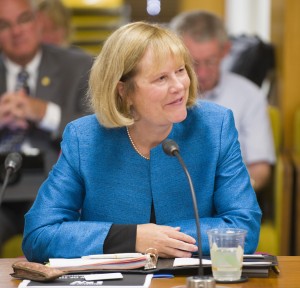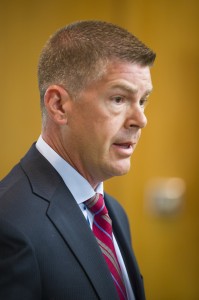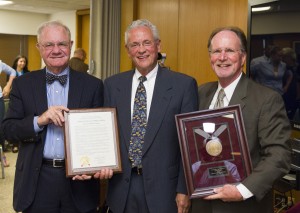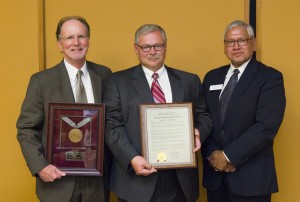MADISON – The University of Wisconsin System Board of Regents unanimously voted Thursday to freeze resident undergraduate tuition at the 2012-13 levels, in accordance with the state’s biennial budget. The Regents went one step further, voting to also freeze tuition for all graduate students and non-resident undergraduates. The decision will keep UW’s price competitive and to grow revenues from nonresident and international student enrollments, which in turn helps subsidize Wisconsin residents.
UW-Madison had originally proposed tuition increases at four of its professional schools, but asked to defer that request. Regent President Mike Falbo proposed that these professional school increases be addressed at a later date, as part of the Board’s comprehensive tuition strategy.
The operating budget did include new rates for auxiliary operations, including room and board rates and segregated fees. Average annual room and board will increase by $193, or about 3%. Average annual student segregated fees at four-year institutions will increase by $36.
- See the
Senior Vice President for Administration and Fiscal Affairs David Miller, who led the presentation, explained that the tuition freeze will leave the UW with $47 million in costs that would normally be funded from new tuition revenues.
The combination of cuts, transfers, mandated funding of new programs, and expected compensation increases results in $202 million of unfunded spending requirements during the next two years, Miller said, $127.7 million of which will need to be expended in the 2013-14 fiscal year. These changes will create an ongoing structural shortfall of nearly $62 million in the 2015-16 fiscal year.
- See the
- See the
“What’s really significant about this budget and this biennium is that $62-million ongoing annual base reduction,” Miller said. “We can manage the one-time. It’s how do you manage that permanently.”
The unfunded spending requirements and other factors will impact UW System’s program revenue balances, Miller said. He told Regents that FY 2013 carryover balances are expected to reach $785.6. A significant portion of those balances will be used to offset funding shortfalls in the coming year, while other balances will be re-invested by UW institutions in mission-critical programs. Accounting for these and other trends, UW campuses estimate that FY 2014 year-end balances may be $462 million. Miller said cash balances at UW institutions currently average about 21% of base budgets.
Miller noted that the UW has previously sustained large funding cuts by reducing spending, holding positions vacant, and generating new revenue through enrollment growth. In that context, institutions were incentivized to be more entrepreneurial and budget conservatively. “Those two things have generated significant revenue and I think that’s why we’re seeing the balances we are,” Miller said.
Regents discussed other recent changes to the biennial budget, including a 1% statewide pay plan increase in each year of the next two years. While acknowledging that a 1% pay plan is welcome news, UW System President Kevin P. Reilly reiterated the pressing need to address the widening gap between what UW employees earn and what their peers at competing universities and colleges earn. He cited an Inside Higher Ed story highlighting the severe faculty recruitment and retention challenges experienced at UW-Stevens Point.
“That is a painful example of our compensation problem that all of us – Regents, the System, Chancellors, elected officials – need to work together to change,” Reilly said.
Regent Janice Mueller, former state auditor, noted that all budgets have winners and losers, and noted that six institutions in the System will not have increased spending authority in this biennium.
Addressing other legislative requirements in the budget, Regent Jerry Whitburn spelled out the key assignments the UW must complete related to identifying methodology and setting policies for tracking and distributing program balances and reserves. “Typically, large public systems do not have a formal carry-forward policy in place,” Whitburn said. “We have been directed by the legislature to put one in place.”
David Ward, Interim Chancellor at UW-Madison, called for the Board to seek an open discussion in the state about what is the proper public/private responsibility for covering tuition as part of a longer-term approach to tuition policy.
Ward said that while institutions have traditionally dealt with revenue crises through cost containment and technology and innovation, those tactics require realistic and competitive tuition rates relative to peers.
“If your price is $5,000 less than most of your competitors – Minnesota, Illinois, Iowa, Indiana – then you’re trapped by using up all your innovation just to catch up with other people’s price,” he said. “It would be good for us to decide what is a fair price and then guarantee going forward very prudent increases in tuition.”
Regents receive recommendations for internal audit function
Responding to a UW System leadership request, an independent review team presented a series of recommendations to optimize the Internal Audit function at UW System. The team, comprised of experts from Duke University and the accounting firm Baker Tilly, addressed the Business, Finance and Audit Committee.
- See the
To effectively fulfill its fiduciary responsibility, the review team recommended the Board of Regents establish a separate Audit Committee with a defined charter and oversight responsibilities. The team further suggested that the internal audit director – or chief audit executive – should report directly to the Audit Committee with a dotted line to the President.
To improve the effectiveness of the internal audit function, the team also recommended that internal audit staff at all institutions should report directly to the System chief audit executive to allow for better prioritization and coordination of audit activities.
Michael Somich, executive director of Internal Audit at Duke University, told the Committee that the new Audit Committee should ensure that Systemwide facilitation and monitoring exists for internal audit functions, the enterprise risk management process, and institutional compliance programs.
After hearing the recommendations, there was discussion about the CAE’s reporting relationship with the audit committee and/or the System president.
“We believe this structure will support the evolution of the internal audit function, from where it has been to a much more robust function that is accountable,” said Christine Smith of Baker Tilly, adding that the goals are ensuring independence and objectivity.
President Reilly suggested to the Committee that additional time might be beneficial to more fully understand implications of the dotted-line reporting relationship, and to get input from Chancellors.
The Committee ultimately approved a resolution incorporating most of the review team’s recommendations, but allowing for additional discussion of the reporting relationships.
Regent Jan Mueller also expressed some concern about the time and skill set required to meet the necessities of audit function.
Regents salute Academic Staff excellence
The Regents honored this year’s recipients of the Academic Staff Awards for Excellence, the highest recognition bestowed on members of the UW System’s academic staff.
The 2013 recipients are:
- Susan Greene, Institutional Planner, Office of Planning, Assessment, Research and Quality (PARQ), UW-Stout.
- Freda Briscoe, Director, Minority Business and Minority Teacher Preparation programs, UW-Whitewater.
- Distance Learning Center, UW-Platteville.
“Without these talented individuals, we could not achieve the level of educational excellence, service to students, and dedication to community that have made, and continue to make, UW System institutions among the nation’s finest,” said Regent Mark Tyler, who chaired the selection committee.
- See the UW System news release of July 2.
- For more about the winners, see the Regents awards website.
Regent Tyler introduced Susan Greene, who has been the main point of contact for graduate students at UW-Stout, providing assistance with thesis research from planning methodology to assisting with data analysis and interpretation. He noted that under her leadership, the number of graduate student projects at UW-Stout has more than doubled during the last three years.
In accepting the award, Greene said that she really cares about helping people, be it students, faculty members, or staff members. “My primary goal is to help them be successful in what they need to do….I’m there to help them along the way, but at the end of the day, it’s their accomplishment.”
Regent Tim Higgins presented the second individual Award for Excellence to Freda Briscoe, who has been on staff at UW-Whitewater since 1992. Calling her work “a labor of love,” Higgins told Regents that Briscoe’s enthusiasm and dedicated attention to both the Minority Business and Minority Teacher Preparation programs have increased participants’ grade-point averages and enhanced the retention and graduation rates for first-generation and underrepresented students.
Briscoe thanked her colleagues who “twisted her arm” to apply for the award. She reflected that – among many contributing factors – an outstanding academic staff member is surrounded by an outstanding cast of colleagues, is “trustworthy, dependable, and committed to institutional purposes and goals,” and “never, never forgets that students are why we are there.”
Regent Tracy Hribar presented the group award to the Distance Learning Center at UW-Platteville, represented by its executive director, Dawn Drake. Hribar told the Board that the center offers degree programs at the graduate and undergraduate level to meet the needs of non-traditional, place-bound students, typically working adults with families. Course registrations at the center have boomed over the last decade.
After introducing several colleagues who were able to attend today’s ceremony, among them Director Dan Avenarius, Drake emphasized that the center’s goal was always to offer “complete [online] degree programs for people in nontraditional situations” – not just stand-alone online classes. Online degree programs were not common when the center got off the ground almost 15 years ago. Over that time, the center has had broad reach, Drake said, including serving students in all 50 states, all 72 counties in Wisconsin, and 48 countries.
Citing representative student comments about the program, Drake said they often fall into three categories: 1) gratitude for the opportunity to complete a degree while maintaining family and work commitments; 2) surprise at how interactive the online courses are; and 3) frequent offers of promotions, raises, or other job opportunities after graduation.
Regents recognize incoming, outgoing colleagues
The Board welcomed three new members. Regent Margaret Farrow of Pewaukee and Regent Janice Mueller of Madison were appointed by Gov. Scott Walker on June 10. Regent Drew Petersen of Verona succeeds Regent Mark Tyler as President of the Wisconsin Technical College System Board and ex-officio member of the UW System Board of Regents.
Regent Farrow is a former lieutenant governor of Wisconsin – the first woman in state history to hold that office – a former state legislator, and former president of the Elm Grove Village Board.
Regent Mueller was appointed by the Legislature in 1998 to serve as the state auditor within the Wisconsin Legislative Audit Bureau. She was also the first woman to hold that position. After retiring in 2011, she was honored with a joint resolution of the Legislature for her 35 years as a public servant, which included serving as a legislative fiscal analyst in the Legislative Fiscal Bureau.
Regent Petersen is Vice President for External Affairs and Corporate Communications for TDS Telecommunications Corp, where he directs nationwide corporate communications, legislative, regulatory, public relations, and charitable giving and serves as chief corporate spokesperson.
Four Regents’ terms of service on the Board of Regents are now expired. The Board recognized two of those Regents on Thursday: Regent Jeffrey Bartell and Regent Mark Tyler.
Regent David Walsh, who has known Bartell for over 54 years since they first met during their sophomore year in high school, described Bartell as “a real community leader” and praised his patience and thoughtfulness. In his farewell remarks, Bartell reiterated how much he admires the UW System and that he is “in awe of the talents and dedication” of university leaders, faculty, and staff. He also decried the legislative lashing the UW System received over the program revenue balances, saying that once more was known about those balances, what they were to be used for, and how they compared with the reserves of other institutions, the balances were “what many experienced financial managers would call prudent reserve ratios and business practices” – equaling about 90 days’ worth of operations.
Bartell also observed that, despite disagreements over policy matters or actions of the Board, in his experience, “All of the Regents have as their principle concerns – and sometimes very passionately – the best interests of the UW, the people of Wisconsin, and our students.”
Regent José Vásquez, who read Regent Tyler’s resolution of appreciation, said three phrases came to mind immediately to best describe Tyler: “consummate professional, ambassador par excellence, and boundless energy.“
Tyler said he has been completely impressed by UW faculty, staff and students, from “athletics to water,” and, like the rest of the nation, he’ll be watching as the UW leads the way with the UW Flexible Option in the next few years. He said that if he had a UW genie he would wish for three things – to achieve seamless transitions between the technical college system and the UW (and vice versa), to ensure every UW undergraduate has some type of experiential learning or undergraduate research experience, and to have the UW follow the technical colleges’ lead and not charge high school students for tuition. He said, “I know genies aren’t real. I know relationships are, and I value each and every one that I’ve created over the past several years.”
Former Regent President Brent Smith and Student Regent Katie Pointer will be recognized on Friday.
In other Board of Regents action on Thursday:
-
The Capital Planning and Budget Committee:
- Approved UW-Madison’s request for authority to increase the scope and budget of the Elizabeth Waters Residence Hall Renovation project to provide for the installation of a fire suppression system for the entire building including resident rooms, common areas, and the kitchen/dining area;
- Approved UW System’s request for approval of three All Agency Maintenance and Repair projects on the UW-Madison campus totaling about $3.8 million. These requests include phase six of a multi-building energy conservation project to implement energy conservation opportunities in two research buildings (the Waisman Center and the Wisconsin Institute for Medical Research) and two other projects that provide upgrades to the Walnut Street utility tunnel and the heating plant.
-
The Research, Economic Development, and Innovation Committee:
- Heard several presentations on facilitating undergraduate research and economic development opportunities. See “ ” and “ ” presentations;
- Approved a resolution supporting the assignment of a portion of UW System economic development economic incentive funds as match funding for Wisconsin Economic Development Corporation (WEDC) grants, to foster commercialization and business start-up activity across the state and to take advance of the fund commitment from WEDC. This will allow the funds to be directed to businesses and start-ups with oversight from WiSys.
- The Education Committee:
- Approved three collaborative baccalaureate degree programs in Engineering Technology brought forward by UW-Green Bay and UW-Oshkosh: Bachelors of Science in Environmental Engineering Technology, Mechanical Engineering Technology, and Electrical Engineering Technology;
- Approved UW-Whitewater’s proposal for a Doctor of Business Administration. This will be UW-Whitewater’s first professional doctorate degree. It will also be the first professional doctorate in Business Administration offered by one of the comprehensive universities in the UW System.
- The Business, Finance, and Audit Committee:
- Approved three contracts for pouring rights in UW-Madison Athletic facilities: A single five-year contract for carbonated soft drink beverages with Dr. Pepper Snapple Group, Inc., with an approximate value of $1 million; two separate three-year contracts (each with two optional one-year extensions) with Badger Max, Inc. One contract for bottled water and one contract for isotonic drinks have approximate values of $260,000 and $900,000, respectively;
- Approved a three-year contract for campus-wide vending services with Compass Group USA. The contract includes four optional one-year extensions and a guaranteed minimum payment to the University of $380,000 per year. If all extensions were exercised, the contract would provide the institution with a minimum of $2.7 million;
- Approved a fee for service contract between the UW-Madison School of Medicine and Public Health and Parexel International, LLC. The agreement includes a one-year General Services Agreement, which will serve as a master agreement, as well as an initial Statement of Work wherein the University agrees to perform certain services in support of a large clinical trial involving Alzheimer’s disease. The initial work is expected to generate payments to the University of approximately $1.8 million;
- Approved a new contract with Desire2Learn Ltd., the current provider of Learning Management Software. Total cost of the contract is $3,572,240 over the three-year life of the contract. Two optional one-year extensions are also possible with an annual cost escalation factor capped at 5% for all five years;
- Approved an exception to Board policy that requires the entire amount of non-endowed gifts in excess of $250,000 to become Board-designated endowments. While proceeds from the bequest received to date total $357,250, the School of Music at UW-Madison requested an exception to expend receipts in excess of $200,000;
- Approved the UW Flexible Option’s proposed pricing structure and term lengths;
- Approved a methodology for calculating program revenue appropriation balances and reserves for submission to the Legislature’s Joint Audit Committee by Sept. 1, 2013 in accordance with 2013 Wisconsin Act 20; and
- Approved a proposed Regent Policy Document intended to provide Chancellors with guidance in the distribution of both Board of Regents-approved biennial pay plans and on institutionally-funded supplemental pay plan adjustments.
Photo credit: James Gill
###
The UW System Board of Regents will resume its meeting at 9:30 a.m., July 12, 2013, in Van Hise Hall, Madison.
Related: July 12 (day 2) news summary

